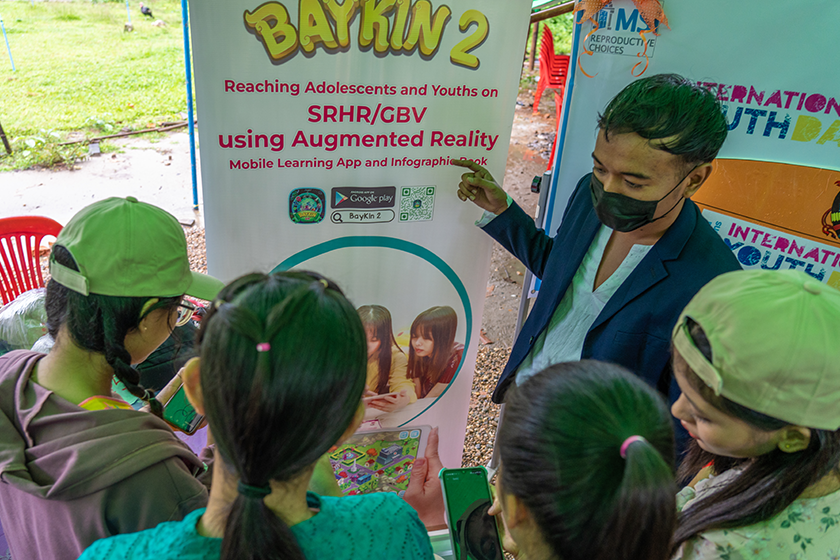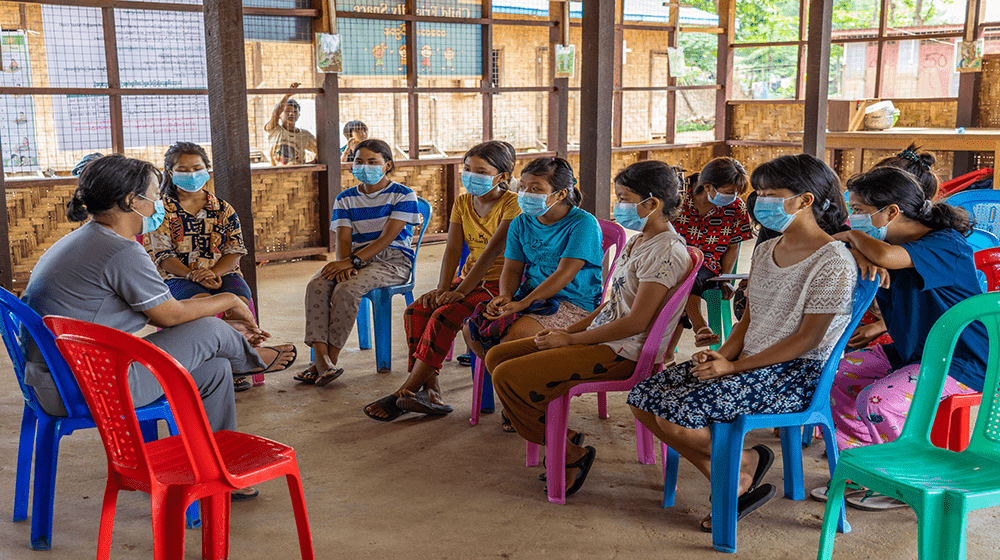YANGON, Myanmar— “There is social stigma existing in our community to speak about sexual and reproductive health especially concerning adolescents and youth. People are too shy to talk about it. Since we have grown up under this shadow, we don’t even know that young people have the right to access sexual and reproductive health information,” said Thura, 15, a local youth from Yangon.
Young people in Myanmar face different social and cultural barriers to get right information about sexual and reproductive health and rights. Without having access to sexual and reproductive health information including family planning, young people tend to experience consequences such as unwanted pregnancy and unsafe abortion, leading to other life-threatening complications. According to 2014 Myanmar Population and Housing Census, the fertility rate of females aged 15-19 was 33 births per 1,000 women. Comparing to urban areas, the teenage fertility is higher in rural areas of states and regions. The data highlights the needs to enhance protection and promotion of sexual and reproductive health and rights of women and young people in remote places and in areas undergoing humanitarian crisis.
The COVID-19 pandemic and political crisis has exacerbated the situation. “Movement restrictions and security concerns hinder young peoples’ access to information and services. How can our rights be fulfilled under these situations? We young people feel like we are lost,” said Thura.
UNFPA, the United Nations sexual and reproductive health agency, works closely with partner organizations in Myanmar to enhance protection and promote sexual and reproductive health and rights of women and young people. In delivering its mandate of sexual and reproductive health and rights, overarching framework of the International Conference on Population and Development (ICPD) Programme of Action and its follow-up convention of ICPD+25, addressing adolescent sexual and reproductive health issues, including unwanted pregnancy, unsafe abortion and sexually transmitted diseases, through the promotion of responsible and healthy reproductive and sexual behavior and reducing adolescent pregnancies are also core areas of UNFPA’s work.
UNFPA, in collaboration with partner organizations and civil society organizations CSOs, facilitates access to sexual and reproductive health for adolescents and young people through innovative approaches. Aung Pike Tun, Programme Coordinator of Marie Stope Myanmar said, “Previously, we provided sexual and reproductive health awareness (in-person) sessions for young people at our youth corner. Due to COVID-19 pandemic and security concern, we adapted the situation and transformed these in-person awareness sessions into comprehensive online learning space. With the support of local youth networks and initiatives, we are able to connect virtually with many young people from different states and regions and provide SRHR awareness and information that they need. It is a huge step-up. For some young people, they feel comfortable and safe via this virtual platform and raise their issues openly for our support. We are so happy to see their interest and active participation going forward.”

Photo: UNFPA Myanmar
With the support from Global Affairs Canada, UNFPA Myanmar has launched Baykin 2 mobile application, partnering with 360ed team. Integrating with Augmented Reality (AR), Baykin 2 app is designed to introduce adolescent and young people in Myanmar to key topics on sexual and reproductive health & right, gender equality, gender-based violence and other youth related contents. This application integrates learning and gaming to increase the engagement of young users and provide better visuals for learning about their bodies and rights. It additionally seeks to equip adolescents and young people with knowledge and tools to be aware of and thus less vulnerable to gender-based violence.
Dr. Peter Kivunike Mukasa, SRHR Programme Specialist of UNFPA Myanmar said, “UNFPA as a Sexual and Reproductive Health Lead Agency, is working with its implementing partner organizations not only to deliver life-saving SRHR and gender-based violence services for women and girls in Myanmar, but also to promote essential SRHR information and GBV awareness for adolescents and young people. To ensure their rights even during this challenging context, we have adapted to the situation quickly and acted innovatively to support them.”
Mya Kalyar Kyaw, 23, a local youth from Kayin said, “Sexual and reproductive health information does save the lives and future of young people. This is not a luxury that we want. This is our fundamental right to access SRHR information without any exception”.


